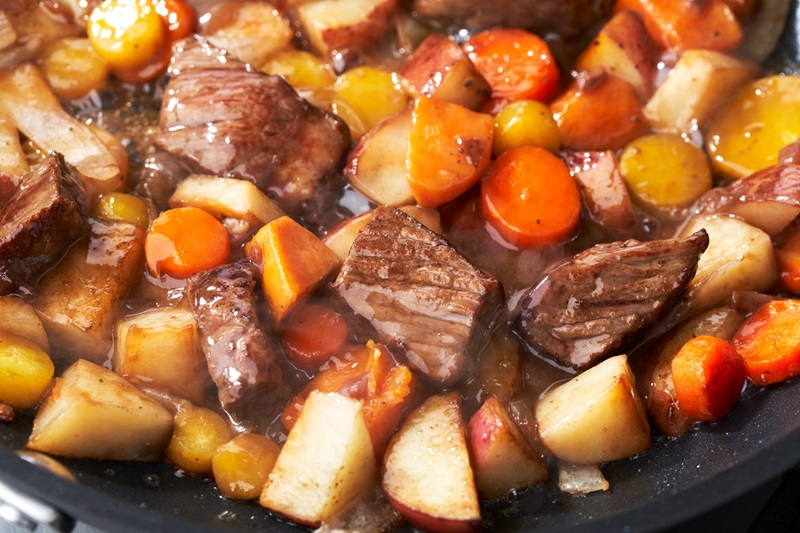When it’s cold and dreary outside, many of us feel the urge to hibernate. Although we don’t sleep through the entire winter like bears, we tend to stay indoors, indulging in comfort foods while longing for warmer days.
However, winter is not the time to neglect your health or weight loss goals. This season brings increased exposure to colds, the flu and other airborne illnesses, especially since we spend more time indoors. The hearty meals we crave on cold days are often high in calories, and the colder weather can lead to decreased physical activity.
We’re here to assist. After delving into scientific research, we’ve compiled a comprehensive guide filled with valuable tips for navigating wellness in the winter season. Discover how to bolster your body’s natural defenses, find ways to burn calories both indoors and outdoors, and explore simple, delicious recipes that satisfy without derailing your healthy diet.
Boosting Your Immune System in Winter: Essential Nutrients and Foods

Avoiding common colds and other viruses entirely during winter is nearly impossible. However, a robust immune system can often prevent these viruses from causing serious symptoms. Beyond defending against minor illnesses, your immune system also shields you from major diseases, including cancer.
According to the Cleveland Clinic, your immune system requires a steady intake of five key nutrients: vitamin C, vitamin B6, vitamin E, zinc and selenium. Consuming a variety of vegetables, fruits, whole grains and legumes is the best way to obtain these essential nutrients. The wider the variety of these healthy foods in your diet, the more likely you are to meet your needs for these vitamins and minerals. Nutritional supplements are an option, but you should consult with your healthcare provider to determine if they’re appropriate for you.
Recent studies have highlighted the significant role of digestive tract microbes in our immune systems, as reported by the Harvard School of Public Health. Prebiotic and probiotic foods support healthy microbial colonies. While all vegetables, fruits, legumes and whole grains contain prebiotic fiber, garlic, onions, asparagus and bananas are particularly rich sources. For probiotics, consider fermented foods and those with live cultures, like yogurt, sauerkraut and kombucha.
Maintaining a healthy weight and eating well can enhance your immune function. Obesity is associated with impaired immune function, according to the Centers for Disease Control and Prevention. Strengthen your immune system by avoiding smoking, limiting alcohol consumption, ensuring adequate sleep and staying active—all of which also support weight loss goals.
Winter Wellness Exercise Tips: Indoor and Outdoor Activities to Keep Fit

Nothing may seem more appealing than cozying up on the couch to binge-watch your favorite series when the weather is frightful. However, it’s crucial to stay active, aiming for at least 30 minutes of exercise daily. This can be broken down into three 10-minute sessions if preferred. The key is to incorporate physical activity into your routine, ensuring you don’t neglect exercise until spring.
Exercising outdoors in cold weather can be invigorating. Activities like walking, hiking, ice skating, cross-country skiing and sledding not only get you out into the fresh air and sunlight but also help you feel warmer upon returning indoors. Dress in layers, protect your extremities, choose shoes with good traction and take extra time to warm up and cool down, especially for vigorous workouts, as recommended by the National Institute on Aging. For more tips, explore Nutrisystem’s advice for exercising in cold weather.
Indoor workouts are equally important for winter wellness. Have a backup plan for days when outdoor conditions are unfavorable. Many gyms and fitness centers offer winter discounts. Swimming provides a great total body workout, and spin classes offer an energetic indoor cycling experience. Alternatively, a wide range of free workout videos are available on YouTube, including calisthenics, Pilates, yoga and Zumba.
You don’t even have to do a formal workout to burn calories. Simple indoor exercises can be done without any special equipment, and even household chores or dancing at a party can burn calories. We put together a list of 10 simple but effective workouts that you can try.
Winter Hydration: Tips for Staying Hydrated in Cold Weather

In warm weather, sweating reminds us to stay hydrated. However, the dry air of winter can lead to dehydration, often without noticeable symptoms, as explained by a report from the Mayo Clinic. Dehydration can slow your metabolism and confuse thirst with hunger, leading to unnecessary eating.
Staying hydrated doesn’t mean you must drink cold water all day. Warm broths, herbal teas and lemon-infused hot water are comforting options. While sports drinks claim to offer hydration benefits, they are often high in sugar and calories and provide little advantage over plain water. Aim for at least 64 ounces of fluids daily, tracking your intake with the Nutrisystem app or a simple tally system.
Healthy Winter Eating: Nutritious Comfort Foods for Cold Months

Winter is the perfect time for comfort foods and hearty meals that warm us from the inside out. Fortunately, enjoying these foods doesn’t have to sabotage your weight loss efforts. The Nutrisystem menu offers a variety of hearty winter meals, like Merlot Beef with Root Vegetables and Roasted Turkey Medallions. Keep your kitchen stocked with these convenient options to avoid supermarket trips on cold days.
When preparing your own meals, focus on nutritious, seasonal vegetables like carrots, beets, squash and sweet potatoes. Pair these with lean proteins in satisfying dishes such as Roasted Chicken with Rainbow Carrots and Potatoes or Dutch Oven Pot Roast. Utilize your slow cooker for easy, flavorful dishes like Chicken Gumbo and Unlimited Vegetable Stew.
When it’s cold outside, we love soup for lunch and dinner. We have tons of healthy soup recipes on the Leaf. All are rich in flavor, easy to make and approved by our team of expert dietitians. We’re talking about classics like Tomato Basil and French Onion. Our Chicken Parm Soup is sure to crush your craving for the classic Italian dish.
Managing Winter Stress: Tips for a Calmer Holiday Season

The holiday season, with its endless to-do list of shopping, cleaning, cooking and party preparations, can be particularly stressful. This stress can manifest as headaches, insomnia, digestive issues, anxiety and even more severe symptoms like chest pain and high blood pressure. Furthermore, stress is a known trigger for overeating and making unhealthy food choices.
While it’s impossible to eliminate stress entirely, you can mitigate its effects. Exercise reduces cortisol levels, which can be harmful when chronically elevated, according to a study in the Journal of Endocrinological Investigation. Even low-intensity activities like walking can help relax both mind and body.
Daily meditation, yoga and tai chi can be effective for reducing stress, offering the additional benefits of low-impact exercise. Maintain your regular sleep routine during the holidays to prevent stress-related overeating and weight gain.
Certain foods, such as salmon, walnuts and dark chocolate, can help manage holiday stress and combat winter blues. Explore our complete list of 10 mood-boosting superfoods for the winter months.
Socializing with family and friends is one of the most effective ways to alleviate stress, as social connections can modify our stress response, according to the American Psychological Association (APA). Engaging in conversations with supportive friends can lower blood pressure and heart rate.
However, if family interactions are the source of stress, seek out friends who offer a listening ear or share a laugh with you. Laughter has been shown to reduce anxiety and depression by altering stress-related factors, as reported in the journal Current Research in Physiology. Regardless of the stress source, finding reasons to smile or laugh can make challenges more manageable.
The post Winter Wellness Guide 2024: Stay Healthy and Fit During Cold Season appeared first on The Leaf.
from The Leaf https://ift.tt/hBfbmIi




